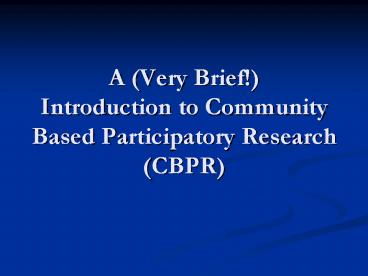A Very Brief Introduction to Community Based Participatory Research CBPR
1 / 15
Title:
A Very Brief Introduction to Community Based Participatory Research CBPR
Description:
By the end of the presentation, participants will know more about: ... Does the burden to the community outweigh potential research benefits? ... –
Number of Views:409
Avg rating:3.0/5.0
Title: A Very Brief Introduction to Community Based Participatory Research CBPR
1
A (Very Brief!) Introduction to Community Based
Participatory Research (CBPR)
2
Objectives
- By the end of the presentation, participants will
know more about - What CBPR is and what it is not
- The history and principles of CBPR
- The purpose of CBPR and
- How to determine whether CBPR is appropriate in a
given situation.
3
Agenda
- Introduction
- Think, Pair and Share
- A Few Key Points
- Reflection
4
Think, Pair and Share
- The facilitator presents a question.
- All participants THINK about the question in
their own minds. - All participants PAIR UP with other participants
and discuss the question. - Participants SHARE with the larger group some of
what they said in their pairs.
5
Brainstorming QuestionWhat do we already know
or imagine about community-based participatory
research (CBPR)?
6
What is CBPR?
- A collaborative approach to research that
equitably involves all partners in the research
process and recognizes the unique strengths that
each brings. CBPR begins with a research topic
of importance to the community and has the aim of
combining knowledge with action and achieving
social change . . . - W.K. Kellogg Community Health Scholars Program
7
What is CBPR NOT?
- A method or set of methods
- Specifically qualitative
8
Purpose of CBPR
- The intent in CBPR is to transform research
from a relationship where researchers act upon a
community to answer a research question to one
where researchers work side by side with
community members to define the questions and
methods, implement the research, disseminate the
findings and apply them. - (CCPH CBPR curriculum, 2006)
9
Why use CBPR?
- Traditional research approaches have failed to
eliminate health disparities. - Community members are tired of having research
done to them rather than with them. - Community members want research to have concrete,
positive outcomes. - Community involvement can produce more valid and
reliable results. - Mutual trust and respect can result in increased
participation in research.
10
Principles of CBPR
- Recognizes community as a unit of identity
- Builds on strengths and resources
- Facilitates partnerships in all research phases
- Promotes co-learning and capacity building
- Seeks balance between research and action
11
Principles of CBPR (cont.)
- Emphasizes local relevance and an ecological
perspective - Involves a cyclical and iterative process
- Disseminates findings and knowledge to all
partners - Involves long-term process and commitment
- Israel, Schulz, Parker, Becker, Allen Guzman,
2000.
12
Questions to ask before initiating a CBPR project
- Is self-interest driving the agenda?
- Do you have the necessary skills?
- Are you a researcher uncomfortable with changing
your methods to work with participants? - Are you a community member who wants a service
but has no interest in research?
13
Questions to ask before initiating a CBPR
project (cont.)
- Does the burden to the community outweigh
potential research benefits? - Do you really buy into the values and
principles of CBPR? - (CCPH CBPR curriculum, 2006)
14
Example of a CBPR Project Poder es Salud/Power
for Health
- Funded by the Centers for Disease Control and
Prevention (CDC) - Purpose To decrease health disparities in the
African American and Latino communities in
Multnomah County, Oregon - Key Strategies Popular Education, Community
Health Workers, CBPR - Partners Latino Network, Emmanuel Community
Services, PSU, OHSU, MCHD
15
Reflection
- What caught your attention about what you have
heard thus far this morning? - Are there questions coming to your mind based on
what you have heard?































